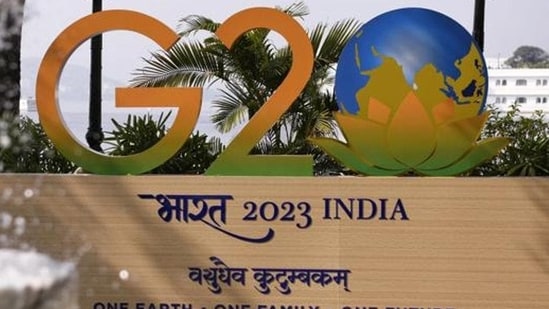India’s G20 Presidency and the China challenge
This article has been authored by Dr. Sriparna Pathak.
Avoiding large scale conflicts has been a common theme in international politics since the Second World War. Laws, treaties, and organisations were created to avoid the horrors witnessed in the Second World War. However, with time, the nature of conflicts also evolved. To navigate newer forms of conflicts, newer approaches to cooperation were established, of which the group of 20 or the G20 is one. Founded in 1999 after the Asian Financial crisis to discuss global economic and financial issues, the G20 was upgraded to the levels of heads of state in 2007, during the global financial crisis. In 2009 it was designated as the premier forum for international economic cooperation. India assumed the presidency of the group in December 2022 amidst various sorts of turmoil ranging from the Russia-Ukraine crisis, an impending food crisis, slowing global economic growth and the COVID 19 pandemic.

While the ongoing Russia-Ukraine war is largely a security issue, fallouts have seeped into the economic realm in myriad ways, including food and energy crisis. Securing long term economic growth, ensuring the guarantee of food, fertiliser and energy security- particularly for the poorest of the poor becomes important. The Black Sea grain initiative is important in this context. The initiative endeavours to tackle escalating food prices caused by supply chain disruptions due to the ongoing Russia-Ukraine war, and was a deal brokered by the United Nations and Turkey in July last year. Reflecting upon the initiative, Antonio Guterres in November last year had tweeted about how the initiative demonstrates the pertinence of discreet diplomacy in finding multilateral solutions.
India since the beginning of the Russia-Ukraine war has mentioned the importance of peace and has even stated that peace is a side and that it favours diplomacy and dialogue and is in fact one of the handful countries that have been speaking to both sides about the necessity of peace. At various forums, India has highlighted how the impact of the ongoing war have led to related crises unfolding beyond European borders and have led to greater challenges for the Global South in the form of energy and food security challenges, adding to hardships already caused by the COVID19 pandemic. While India has supplied more than 240 million doses of COVID19 vaccines to more than 100 countries, its own capacities for economic support to other countries are now under strain due to the ripple effects of the war.
When India took over the G20 presidency, China was in the process of relaxing its draconian zero COVID policies. What followed soon after the relaxation was nothing short of sheer economic and social havoc. Despite lack of transparent reportage from China regarding the numbers of affected, independent media as well as netizens in China have been reporting about at least 35000 cases per day in China with heart wrenching videos of overcrowded crematoriums and dead bodies being dumped into shoddily dug trenches in the mud. In the first 20 days of December 2022 itself about 248 million people or about 18% of the Chinese population were estimated to have contracted the virus, making it the largest outbreak in the world till date!
China is an important player in international politics and its position as the manufacturing platform of the world only means that a disaster in China is going to create further ripple effects across the global economy. In December last year, the World Bank cut its China growth outlook for 2022 and 2023 citing the impact of the abrupt loosening of the strict COVID 19 policies and persistent property sector weaknesses. It stated that the Chinese economy would grow only by 2.7% in 2022. COVID outbreaks in several cities including in manufacturing hubs like Shenzhen and Tianjin have hurt economic activities across sectors. During crises, and during health crises in particular, consumption decreases as the public wants to save up for mitigating the crisis instead of spending earnings or savings on consumption. Thus, sectors like food, beverages, retain, and tourism come under pressure, in turn putting other major services under pressure.
The scale at which the health crisis in China is impacting its economy is bound to affect trade and supply chains worldwide, adding to the already existing problems caused by the Russia-Ukraine war. To add to this, the possibility of China’s military aggression against Taiwan raises further concerns for the global economy as Taiwan is an important node in the supply chain of several hi-tech goods, including semiconductors. Military aggression emanating from China is not something new for India, which has itself been locked in a military conflict at the borders since 2020 owing to Chinese disregard for treaties and agreements on maintaining peace at the borders.
However, as the president of the G20, what becomes worrisome for India amidst the unfurling health, and socio-economic crisis in China is the fact that India’s neighbourhood itself is in flux. There has been a complete economic collapse in Sri Lanka, Myanmar has been under a military coup, Bangladesh has sought help form the International Monetary Fund amidst rising inflation and depleting foreign exchange reserves, Pakistan has been under perpetual political and financial turmoil and while there is a new government in Nepal which brings fresh challenges in any case, there is the thorny issue of declining foreign exchange reserves in Nepal. Thus, the challenges for India’s G20 presidency are myriad, and dealing with the challenges currently emanating from China become pertinent for India to tackle.
This article has been authored by Dr. Sriparna Pathak.



